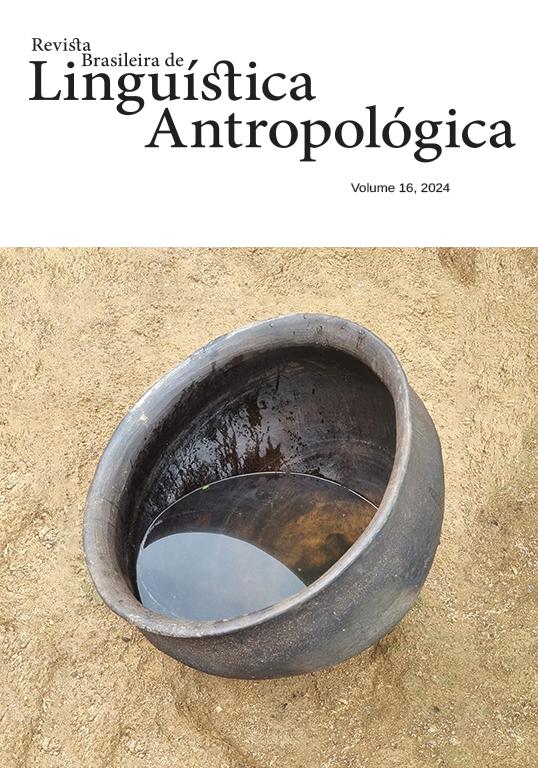A construção social de tempo baseado em eventos nas culturas indígenas Awetý, Kamaiurá e Huni Kuĩ
DOI:
https://doi.org/10.26512/rbla.v16i1.51931Keywords:
Time, Events, Lingua, Cognition, LanguageAbstract
Huni Kuĩ, Awetý, and Kamaiurá people perceive time in terms of social and environmental events. This perception is expressed through words and expressions that are used in everyday life, cultural activities, and practices. These expressions are used when speakers refer to facts that require temporal marks, such as planning parties, planting, harvesting, and organizing a typical day. The present article examines how time intervals are lexicalized and indexed in these languages and cultures. It focuses on a linguistic inventory of temporal marks related to life stages, divisions of day and night, and seasonal intervals that guide social life. This work discusses how the sun, moon, and stars are inserted in the event-based time indexicalization process. It also explores the use of numbers, hands, fingers, knots in a rope, and marks on wood as temporal indexicalizers and numbers. Additionally, it examines how hybrid calendars and other cultural aspects represent time intervals based on events in these languages and cultures.
Downloads
References
Referências
Cardoso, Walmir T. 2007. O Céu dos Tukano na escola Yupuri Construindo um calendário dinâmico. Tese de doutorado. São Paulo: Pontifícia Universidade Católica.
Cardoso, Valéria. F. 2008. Aspectos Morfossintáticos da Língua Kaiowá (Guarani). Tese de doutorado. Campinas: UNICAMP.
Faleiros, Alvaro e Yawabane, Leopardo. 2014. Assim se Fez a Lua. Publifolha.
Fauconnier, G. and Turner, M. 2008 Rethinking metaphor. In Gibbs, R. (ed.) The Cambridge Handbook of Metaphor and Thought. (pp. 53–66.) Cambridge: Cambridge University Press.
Kamaiwrá, Aisanain, P. 2010. Uma Análise Linguistico-Atropológica de exemplares de dois gêneros discusivo em Kamaiurá Dissertação de Mestrado. Brasília: Universidade de Brasília..
Kamaiwrá, Aisanain, P. 2015. O kwaryp de kanutari: uma abordagem linguística e etnográfica. Tese de doutorado. Brasília: Universidade de Brasília.
Kaxinawa, Joaquim. 2011. Confrotando Registros e Memorias Sobre a Língua e a Cultura Huni Kuĩn: De Capistrano de Abre aos Dias Atuais . Dissertação de Mestrado. Brasília: Universidade de Brasília.
Kaxinawa, Joaquim. 2014. Uma Gramática da Lígua Hãtxakuĩ Tese de doutorado. Brasília: Universidade de Brasília.
Ramos, Diego. F. 2010. O Tempo em kamayurá. Dissertação de Mestrado. Florianópolis: Universidade Federal de Santa Catarina..
Rodrigues, Aryon. D. I., e Cabral, Ana. S. A. 2012. Tupian. In L. Campbell & V. M. Grondona (Eds.), The Indigenous Languages of South America: A Comprehensive Guide (pp. 59–166). Berlin; New York: Mouton de Gruyter.
Sabino, Wary. K. 2016. Awetýza Ti’íngatú: construindo uma gramática da língua Awetý, com contribuições para o conhecimento do seu desenvolvimento histórico. Tese de doutorado. Brasília: Universidade de Brasília.
Sampaio, Wany., Sinha, Chris., Silva Sinha, Vera da, and Zinken, Jorg. 2017. A noção de tempo: uma construção social e linguística. Revista Brasileira de Linguística Antropológica 8.1: 47-60.
Severino-filho, João. 2015. Marcadores de tempo apyãwa a solidariedade entre os povos e o ambiente que habitam. Tese de doutorado. Instituto de geociências e ciências exatas da universidade estadual paulista: Júlio Mesquita Filho, Programa de pós-graduação em educação matemática - Campus de Rio Claro, SP.
Silva Sinha, Vera. da., Sampaio, Wany, and Sinha, Chris. 2017. The Many Ways to Count the World: Counting Terms in Indigenous Languages and Cultures of Rondônia, Brazil. (1(1). 1-18. ) Brief Encounters, Retrieved from http://briefencounters-journal.co.uk/BE/article/view/26
Silva Sinha, Vera da., Sinha, Chris., Sampaio, Wany, and Zinken, Jorg. 2012. Event-based time intervals in Amazonian culture. In Filipović, Luna & Jaszczolt, Kasia M. (Eds.), Space and Time in Languages and Cultures II: Language, Culture and Congnition (p:15–35). Amsterdam: John Benjamins Publishing Company.
Silva Sinha, Vera da. 2019. Event-based time in three indigenous Amazonian and Xinguan cultures of Brazil. (10, 454 1-21) Frontiers in Psychology: Section Cultural Psychology. (v. 10. P. 454 1-21). doi: 10.3389/fpsyg.2019.00454
Silva Sinha, Vera da. 2018. Linguistic and Cultural Conceptualisations of Event-Based Time in Huni Kuĩ, Awetý and Kamaiurá indigenous communities of Brazil. (Subject Area Anthropological Linguistics). School of Politics, Philosophy, Language and Communication Studies, na University of East Anglia. Inglaterra.
Sinha, Chris., Silva Sinha, Vera da., Zinken, Jorg, and Sampaio, Wany. 2011. When time is not space: The social and linguistic construction of time intervals and temporal event relations in an Amazonian culture. (3(1), 137–169. ). Language and Cognition, https://doi.org/10.1515/langcog.2011.006
Tapirape, Xawapa’io, Leão, Marcelo F. 2017. Importância da pesca com timbó para o povo indígena Apyãwa (Tapirapé) de Mato Grosso. (v. 9, p. 155-167. ). Destaques Acadêmicos.
Vilas Boas, Orlando, and Vilas Boas, Claudio. 1973. Xingu: The Indians, Their Myths. Forward by Kenneth S. Brecher (ed), trans. Susana Hertelendy Rudge. New York: Farrar, Straus & Giroux.
Vilas Boas, Orlando, and Vilas Boas, Claudio 2009. Xingu: The Indians, Their Myths (Reprint edition). London: Souvenir Press.
Villas Bôas Filho, Orlando (org). 2014. Orlando Villas Bôas e a construção do indigenismo no Brasil. São Paulo: Editora Mackenzie.
Villas Bôas, Orlando. Claudio. 1970. Xingu: Os índios, seus mitos. Rio de Janeiro: Zahar Editores.
Downloads
Published
How to Cite
Issue
Section
License
Copyright (c) 2024 Revista Brasileira de Linguística Antropológica

This work is licensed under a Creative Commons Attribution 4.0 International License.
Authors who publish in RBLA agree to the following terms:
a) Authors maintain the copyright and grant the journal the right of first publication, and the work is simultaneously licensed under the Creative Commons Attribution License, which allows the sharing of the work with recognition of the authorship of the work and initial publication in this journal.
b) Authors are authorized to assume additional contracts separately, for non-exclusive distribution of the version of the work published in this journal (eg, publish in an institutional repository or as a book chapter), with recognition of authorship and initial publication in this journal.
c) Authors are allowed and encouraged to publish their work online (eg, in institutional repositories or on their personal page) at any point before or during the editorial process, as this can generate productive changes, as well as increase impact and citation of the published work.







